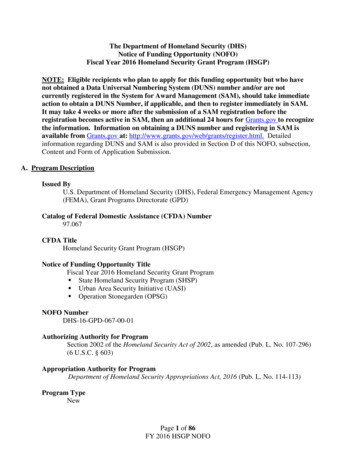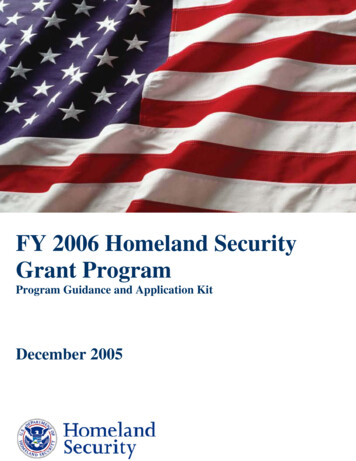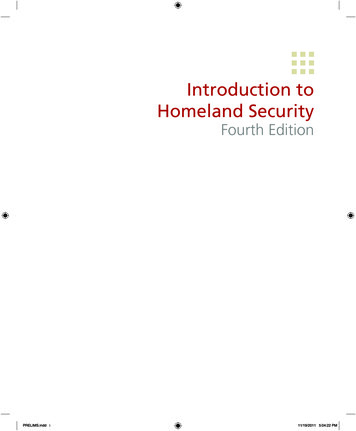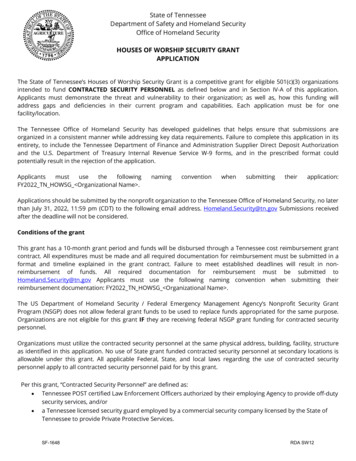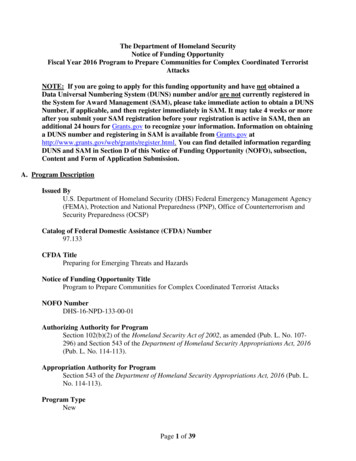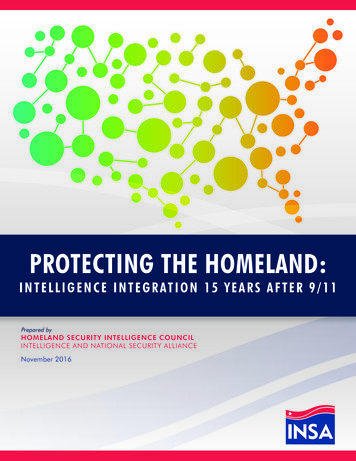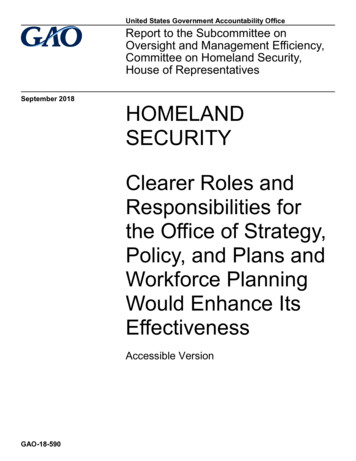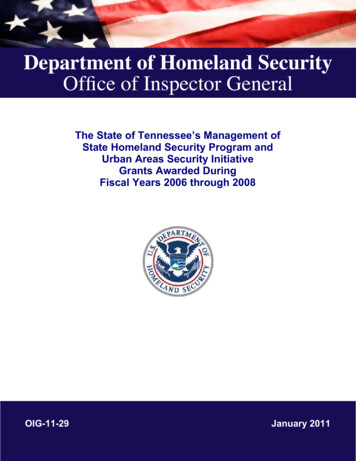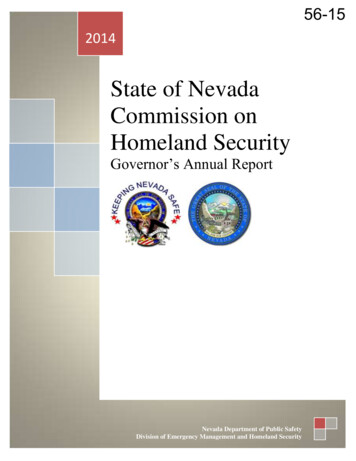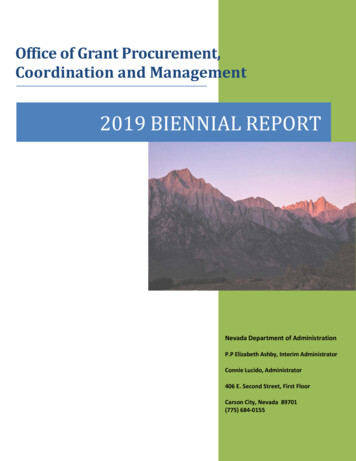
Transcription
FY 2016 Homeland Security Grant ProgramFrequently Asked Questions1. Who can apply?Only eligible applicants may apply for HSGP funds. Eligible applicants include: Local unitsof government, as defined in the Department of Homeland Security Appropriations Act of2005, refer to "any county, city, village, town, district, borough, special district, or other politicalsubdivision of any State.” The lead applicant is responsible for grant funds and administration:including but not limited to assurances and audit requirements, maintenance or records, etc.2. If a hospital is a partner of the applying agency, would the funds flow to the hospital orthe applying agency?Only the applying agency would receive the funds.3. Who is awarding the funds to the sub-grantees? Is it the Federal Government or theState Government?The State receives the funds from the Federal Government and awards the sub-grantees.5. What is “WHOLE COMMUNITY”?Whole of Community encompasses two key concepts:1. Ensuring that our response and recovery actions are driven by the actual needs ofthe entire affected community and the conditions on the ground, including thepopulation demographics and geographic location; and2. Ensuring that we leverage and rely upon the resources of the entire emergencymanagement team to the greatest extent possible in meeting these needs.3. Whole of Community IS NOT merely catastrophic planning. Its concepts willeventually be applied across FEMA and impact every mission that FEMAexecutes. Whole of Community describes a distinct operational approach thatreinforces the fact that FEMA is only one part of our nation’s emergencymanagement team; that we must leverage all of the resources of our collective teamin preparing for, responding to, recovering from and mitigating against all hazards;and that collectively we must meet the needs of the entire community in each ofthese areas.6. If an application identifies multiple jurisdictions, must the application have signaturesfrom each jurisdiction?Supporting documentation, such as letters of recommendation/support/MOUS, must beattached.7. Do specifications on purchases need to be included in the application?Yes, include anything that will make it clear to the reviewer as to what is being purchased andwhy it is needed. Also the AEL sheets showing eligibility of the item must be attached to theapplication. tsFrequently Asked QuestionsS:\Commissioner\Grants\Shared\Homeland 2016\Web Page\2016 & 2017 FAQ.docxPage 1 of 10
8. Can an agency submit more than one application?Yes, an agency can submit as many applications as they want. It is important that only oneproject be identified on each application.10. Is there mandatory cost share or matching required?No – This grant is 100% federally funded.11. Are there any document pages that do not count as part of the page limit? For example,what if we need a page to cite our references? Does this page have to count?There is no limit on supporting documents, attachments, or budget information.12. What is the period of the award?Projects funded under this program application have up to one month prior to the grant’s federalexpiration date to complete approved activities and submit their final reimbursement requestincluding invoices and cancelled checks. Projects must be completed by July 30. 2019.13. What are the reporting requirements?Each project funded by the NH DOS under the HSGP shall contain an evaluation component.Quarterly reports containing programmatic and financial information will be required.DHS mandates recourse typing for all assets. The forms and instructions for this will be suppliedupon grant award.The DOS/GMU may conduct periodic site visits to review grant compliance, assess managementcontrols, assess the applicable activities and provide technical assistance. In addition, the subgranteeagrees to provide any data or information needed for the purposes of monitoring and programevaluation.14. What are the Financial Requirements that pertain to this grant?The financial management requirements of federal and state government, as well as the NHDepartment of Safety’s policies and procedures, govern grants funded under HSGP. Grantactivities must be conducted in accordance with the applicable guidance of 2 CFR Part 200 as of12/26/2014.15. What is supplanting and how does it apply to a project?Federal Homeland Security grant funds will be used to supplement (add to) existing funds, andwill not supplant (replace) funds that have been locally appropriated for the same purpose.Potential supplanting will be addressed in the application review as well as in the pre-awardreview, post award monitoring, and the audit. Applicants and/or grantees will be/may berequired to supply documentation certifying that a reduction in non-federal resources occurredfor reasons OTHER than the receipt or expected receipt of federal Homeland Security grantfunds.Supplanting funds is loosely defined (for these purposes) as using federal grant money to“replace” or “take the place of” existing local funding for equipment or programs. The fundsare intended to provide local entities with increased capabilities or to build capacity to addressFrequently Asked QuestionsS:\Commissioner\Grants\Shared\Homeland 2016\Web Page\2016 & 2017 FAQ.docxPage 2 of 10
CBRNE/WMD terrorist incidents. The funds are not to be used to replace items that areworn out/broken or for replacing (supplanting) routine local budget expenses. Supplantingfunds is loosely defined (for these purposes) as using federal grant money to “replace” or “takethe place of” existing local funding for equipment or programs. The funds are intended toprovide local entities with increased or in 2016 sustained capabilities or to build capacity toaddress CBRNE/WMD terrorist incidents. The FY 2016 HSGP plays an important role in theimplementation of Presidential Policy Directive 8 (PPD-8) by supporting the developmentand sustainment of core capabilities. Core capabilities are essential for the execution of eachof the five mission areas outlined in the National Preparedness Goal (NPG).16. Is Project Income allowed?No. Project income is not allowable under the protocols of the NH Department of Safety.17. Are any of the eligible equipment items on State Price Contract?Please refer to the NH Department of Administrative Services, Bureau Purchase and Propertywebsite. https://das.nh.gov/purchasing/Contracts posteddte.asp?sort cna18. Can we contract with Consultants?Compensation for individual consultant services must be reasonable and consistent with that paidfor similar services in the market place. The policy is that the maximum rate for consultants is 650(excluding travel and subsistence costs) for an 8-hour day or 81.25 per hour. An 8-hour day mayinclude preparation, evaluation and travel time in addition to the time required for the actualperformance. Additionally, travel and subsistence costs may be paid. A request for compensationfor over 650 a day requires prior approval and additional justification. This must also be approvedby the US Department of Homeland Security/FEMA.2016 HSGP grant guidance the following may apply to your project:HSGP Program grantees using funds for construction projects must comply with the Davis-Bacon Act(40 U.S.C. 3141 et seq.). Grant recipients must ensure that their contractors or subcontractors forconstruction projects pay workers employed directly at the work-site no less than the prevailingwages and fringe benefits paid on projects of a similar character. Additional information, includingDepartment of Labor (DOL) wage determinations, is available from the following m. It is recommended that your Departmentreview the criteria that apply to the project at this site and act in accordance with guidance fromUS DOL.Arrangements with individuals must ensure that: Dual compensation is not involved (i.e., the individual may not receive compensation fromhis regular employer and the applicant for work performed during a single period of timeeven though the services performed benefit both). The contractual agreement is written, formal, proper and otherwise consistent with theapplicant's usual practices. Time and/or services for which payment will be made and rates of compensation must besupported by adequate documentation.Frequently Asked QuestionsS:\Commissioner\Grants\Shared\Homeland 2016\Web Page\2016 & 2017 FAQ.docxPage 3 of 10
Travel and subsistence costs are at an identified rate consistent with the cost allowed inSection III, Travel.19. What can Homeland Security Grant Program funding be used for?See: ts . HSGP funding shall be used inareas for projects that enhance New Hampshire’s capabilities. The State Homeland Security GrantProgram (SHSGP) is a core assistance grant program that provides funds to build capabilities at thestate, local, Tribal, and territorial levels and to implement the goals and objectives included in theState Homeland Security Strategy and initiatives in their State Preparedness Report (SPR). UnderSHSGP, activities must support terrorism preparedness by building or enhancing capabilities thatrelate to the prevention of, protection from, response to, and recovery from terrorism (to beconsidered eligible).However, many capabilities which support terrorism preparednesssimultaneously support preparedness for other hazards. Grantees must demonstrate this dualpurpose for any activities implemented under this program that are not explicitly focused onterrorism preparedness.20. What kind of equipment can I apply for?Equipment must be individually listed and approved through the original grant application or insubsequent grant adjustment notices prior to the purchase of the equipment. Allowable equipmentcategories for FY16 are listed in the application and on the web-based Authorized EquipmentList (AEL) at ts.Information Bulletin No. 407 - Use of Grant Funds for Controlled Equipment, provides detailson the process and requirements for requesting controlled equipment. FEMA Form 087-0-0-1 Controlled Equipment Request is available for download. Any questions concerning the eligibilityof equipment should be forwarded to the DOS/GMU for clarification.Applicants shall use their own procurement procedures and regulations if they are more stringentthan Federal Requirement 28 CFR Part 66 (formerly OMB Circular A-102) or OMB Circular A110, as applicable. Minimum compliance is the federal standard. All efforts to expedite theprocurement process should be made.21. What are the Unauthorized Program Expenditures? Expenditures for items such as general-use software (word processing, spreadsheet,graphics, etc.), general-use computers and related equipment (other than for allowable M &A activities, or otherwise associated preparedness or response functions), general-usevehicles, licensing fees, weapons systems and ammunition. Acquisition of land Hiring of public safety personnel Activities unrelated to the completion and implementation of the SHSP Other items not in accordance with the AEL or previously listed as allowable costs. FCC Licenses22. If the state approves equipment within the application, is the local agency required tosend out a bid?Frequently Asked QuestionsS:\Commissioner\Grants\Shared\Homeland 2016\Web Page\2016 & 2017 FAQ.docxPage 4 of 10
The local agency must follow the local procurement regulations and laws or Federal Terms thatapply to such from 2CFR 200. Whichever terms protects the Federal dollars most strenuouslyshall be applied and monitored for.23. Is the installation of equipment considered construction?No, if it is considered as additional or related equipment costs not requiring EHP approval. SeeAEL listing at: tsYes, if the equipment will be attached to a structure in any way or if the AEL lists EHP as arequirement.2016 HSGP grant guidance the following may apply to your project:HSGP Program grantees using funds for construction projects must comply with the Davis-Bacon Act(40 U.S.C. 3141 et seq.). Grant recipients must ensure that their contractors or subcontractors forconstruction projects pay workers employed directly at the work-site no less than the prevailingwages and fringe benefits paid on projects of a similar character. Additional information, includingDepartment of Labor (DOL) wage determinations, is available from the following m. It is recommended that your Departmentreview the criteria that apply to the project at this site and act in accordance with guidance fromUS DOL.Construction and RenovationConstruction and renovation costs to achieve capability targets related to preventing, preparing for,protecting against, or responding to acts of terrorism are allowed under this program. Forconstruction costs to be allowed, they must be specifically approved by DHS/FEMA in writing priorto the use of any program funds for construction or renovation. Limits on the total amount of grantfunding that may be used for construction or renovation may apply.Project construction using SHSP and UASI funds may not exceed the greater of 1,000,000 or 15percent (15%) of the grant award. For the purposes of the limitations on funding levels,communications towers are not considered construction.Written approval must be provided by DHS/FEMA prior to the use of any HSGP funds forconstruction or renovation. When applying for construction funds, including communicationstowers, at the time of application, recipients must submit evidence of approved zoning ordinances,architectural plans, any other locally required planning permits, and a notice of Federal interest.Additionally, recipients are required to submit a SF-424C Budget and Budget detail citing the projectcosts.When applying for funds to construct communication towers, recipients and sub-recipients mustsubmit evidence that the FCC’s Section 106 review process has been completed and submit alldocumentation resulting from that review to GPD using the guidelines in EHP Supplement prior tosubmitting materials for EHP review. Completed EHP review materials for construction andcommunication tower projects must be submitted as soon as possible to get approved by the endof the period of performanceHSGP Program recipients using funds for construction projects must comply with the Davis-BaconAct (40 U.S.C. § 3141 et seq.). Recipients must ensure that their contractors or subcontractors forconstruction projects pay workers no less than the prevailing wages for laborers and mechanicsFrequently Asked QuestionsS:\Commissioner\Grants\Shared\Homeland 2016\Web Page\2016 & 2017 FAQ.docxPage 5 of 10
employed on projects of a character similar to the contract work in the civil subdivision of the statein which the work is to be performed. Additional information regarding compliance with the DavisBacon Act, including Department of Labor (DOL) wage determinations, is available from thefollowing website http://www.dol.gov/whd/govcontracts/dbra.htm.OPSG funds may not be used for any type of construction24. Is computer software allowable?Yes, if the software is used to accomplish the project activity. However, general use hardwareand software is only an allowable cost under Management and Administration (M&A).25. Would the hiring of security personnel be allowable?No.26. When can I purchase items on the approved budget?After a sub-grant to a jurisdiction has been approved, DOS/GMU will issue an awarddocument including grant requirements. Spending of funds may begin as soon as officials ofthe jurisdiction sign, date, and return the award documents to the DOS/GMU and you receiveapproval to proceed. Additional restrictions may be applied upon DOS and you will benotified of how to proceed with your grant at that time.27. How does the grant process work as far as getting reimbursed for expenditures?The sub-grants awarded by the DOS/GMU are reimbursement grants only, meaning that thejurisdiction must spend the money upfront for the grant approved items, complete the projectinstallation and testing (if required) and then apply to DOS for reimbursement of thoseexpenditures. Jurisdictions may submit the proper documentation at any time after itsexpenditures and project completion (reimbursement request letter on Agency letterhead,invoices, and cancelled checks).28. Do I have to have cancelled checks before I can request reimbursement?Yes, invoices and cancelled check(s) are required before reimbursement will be made. Also, subrecipients must also meet the following requirements before reimbursement: NIMS compliance Single Audit compliance Completed quarterly report Resource typing is updated Environmental approval (when project applicable)29. What is accepted as “proof of payment”?“Cancelled checks ” or the bank screen print showing the payment is cleared and tied to thatpurchase.30. Why do I need to provide proof of payment?DOS “reimburses” only. Proof of payment ensures that the request is a reimbursement not anadvance and that only eligible approved costs are reimbursed with HSGP program funds.Frequently Asked QuestionsS:\Commissioner\Grants\Shared\Homeland 2016\Web Page\2016 & 2017 FAQ.docxPage 6 of 10
Before reimbursements are made the project should be completed in accordance with approvedgrant plan.31. What are the supporting documents needed to get reimbursed?All requests for reimbursement must include a copy of invoices (not statements or quotes) andproof of payment (see #28). DOS may also require detailed comparison of purchases to matchwith the original application. Exercise reimbursement requests must be coordinated throughthe Department of Safety, Homeland Security and Emergency Management’s ExerciseCoordinator. Training reimbursements will be coordinated through the Department of Safety,Fire Standards and Training and EMS’s Chief Jeffrey Phillips. Payroll verification is mandatoryfor personnel reimbursement for training and exercises. See separate background forrequirements.32. After a grant has been approved, may we make changes to the grant?Generally, changes in the intent of an award are not allowed. On a limited basis, DOS mayconsider some changes, but the jurisdiction will have to document justification for such anadjustment to the grant. No changes to project plan or scope should be undertaken withoutprior consultation with GMU.33. Can changes be made in the grant budget?Changes are allowed within a grant’s budget on a limited basis. But the entity must request thosechanges in writing along with a written justification for the adjustment. Entities may NOTmove funds between grant awards such as from a Planning grant to an Equipment grant. Alsosee #32 here in the FAQs.34. What happens when all my grant funds have been expended?Once the spending cycle of a grant has been reached, all sub-grants are closed and any remainingfunds from the awards are pooled. Extensions can be granted on a limited basis as long as thefederal deadline is not violated. Extensions are granted only under special circumstances. Thejurisdiction must justify and request the extension in writing.DOS will issue a Closeout Letter to the jurisdiction. Officials of the jurisdiction are asked tosign, date, and return a copy of the Closeout Letter to DOS. Monitoring visits may follow.Long-term inventory reporting is required per Code of Federal Regulations-Title 2 CFR200.313-Equipment.35. Why am I required to keep documentation after my grant is closed?Federal law requires that documentation (all financial records, supporting documents, statisticalrecords pertinent to the award be retained by each organization for at least three years from thedate the grant is closed at the federal level. This may be up to 5 years from when your grant wascompleted. Check with DOS – GMU for specifics. In addition per Federal requirement thetracking of all equipment must comply with Code of Federal Regulations-Title 2 CFR 200.313Equipment. Updates are required every two years inclusive of reporting the final disposition ofany grant acquired equipment.36. What is NIMS Compliance?Frequently Asked QuestionsS:\Commissioner\Grants\Shared\Homeland 2016\Web Page\2016 & 2017 FAQ.docxPage 7 of 10
Per the 2016 Homeland Security Funding Opportunity Announcement, grantees receivingHSGP funding are required to implement the National Incident Management System(NIMS). The NIMS uses a systematic approach to integrate the best existing processes andmethods into a unified national framework for incident management. Incident managementrefers to how incidents are managed across all homeland security activities, includingprevention, protection, and response, mitigation, and recovery. FY 2016, grantees mustutilize standardized resource management concepts such as typing, inventorying, organizing,and tracking resources that facilitates the identification, dispatch, deployment, and recoveryof their resources. 2016 Homeland Security Grant applicants must attach a NIMScertification letter of compliance.37. Why are progress reports required?Progress reports are necessary to provide DOS the tools to meet its federal reporting andmonitoring requirements on the status of grants awarded to the state.38. Who has to take NIMS and ICS training?“NIMS Compliance” is required only for those agencies/jurisdictions that wish to apply for any Federalpreparedness grants (Homeland Security, Assistance to Firefighters Act, etc.) However, since ICS is usedacross the country by response agencies for just about all incidents, it is good training to have.Who needs to take what?All first responders, regardless of their discipline (police, fire, Ems, etc.), should take ICS 100, ICS200 and IS 700 or their equivalent training. This provides the basic tools needed to understand and useICS in the field. This training can be done online or in a classroom (with the exception of IS 700 which is onlyonline).Emergency Management Directors should also take IS 800 which is only available online.When it comes to ICS 300 and ICS 400, these are advanced ICS courses which are designed for thosepeople who could or would be in what are called Command & General Staff positions (Incident Commander,Operations Section Chief, etc.). In New Hampshire, the only folks who are required to take these classesare all fire chief officers (chief, assistant chief, deputy chief, etc.), police chiefs of departments with morethan 50 members, county sheriffs and certain State Police.Although anyone is eligible to take these advanced courses, and it would be beneficial for EOC/MACE staffto take them, there is no requirement to do so at this time.This guidance is from the State only; if your agency or jurisdiction requires that you take this training, thenfollow that guidance.Do Selectmen or Town Administrators need this training?Not that much unless you are also a first responder in some fashion. You should, however, have anunderstanding of ICS because your employees (first responders) use it. There is a special program for youfolks, though. It is short and to-the-point. It’s called ICS 402 and it’s an overview of ICS that lets you knowwhat ICS is and how it works. If you are only an administrator, this course will satisfy NIMS compliance forgrants.I work in an EOC/MACE. What should I have?Frequently Asked QuestionsS:\Commissioner\Grants\Shared\Homeland 2016\Web Page\2016 & 2017 FAQ.docxPage 8 of 10
You should have ICS 100 ICS 200 and IS 700 like all other responders. It would help you in your position tohave ICS 300 and ICS 400 as well, but it is not required unless your specific plan calls for it.I took the NFA ICS class or the NH PSTC ICS class. What does this count for?If you completed the 16 hour ICS class from the National Fire Academy (H806) or the 16 hour NH PoliceAcademy class (Critical Incident Management), you have the equivalent of ICS 100 and ICS 200.For further information, please contact Chief Jeffrey Phillips at the DOS – Fire Standards andTraining and EMS (603-223-4200).39. What are the requirements for an HSEEP compliance exercise program?HSEEP Compliance is defined as adherence to specific HSEEP-mandated practices for exerciseprogram management, design, development, conduct, evaluation, and improvement planning. Inorder for an entity to be considered HSEEP compliant it must satisfy four distinct performancerequirements:1. Conducting an annual Training and Exercise Plan Workshop and developing andmaintaining a Multi-year Training and Exercise Plan.2. Planning and conducting exercises in accordance with the guidelines set forth in HSEEPVolumes I-III.3. Developing and submitting a properly formatted After-Action Report/Improvement Plan(AAR/IP). The format for the AAR/IP is found in HSEEP Volume III.4. Tracking and implementing corrective actions identified in the AAR/IP.For further information on Exercises, please contact NH DOS Division of Homeland Securityand Emergency Management (603-271-2231).40. What is the Threat and Hazard Identification and Risk Assessment (THIRA)?FEMA has developed a set of Frequently Asked Questions (FAQ) pertaining to the ComprehensivePreparedness Guidance (CPG) 201: Threat and Hazard Identification and Risk Assessment(THIRA). Topics covered in the FAQ include the identification of supporting THIRA tools,templates and technical assistance, submission procedures, and information on the relationshipbetween THIRA and the State Preparedness Report as well as other reporting requirements.As part of Presidential Policy Directive / PPD-8, the THIRA provides a common, consistentapproach for identifying and assessing risks and their associated impacts. It expands on existingstate, local, tribal and territorial hazard identification and risk assessment processes. The THIRAprocess helps jurisdictions understand likely risks and the core capabilities needed to address them.In New Hampshire the Department of Safety’s Division of Homeland Security and EmergencyManagement is the lead of the THIRA and the annual State Preparedness Report (SPR). Pleasecontact them at 271-2231 for more information.Frequently Asked Questions – THIRA (FY2012) (this is located at Fema.gov)Frequently Asked QuestionsS:\Commissioner\Grants\Shared\Homeland 2016\Web Page\2016 & 2017 FAQ.docxPage 9 of 10
41. Why are we having to apply for two grant periods in one application process?This is anticipated to be a one time adjustment to the grant program. The DHS Program Guidancenow requires projected awards to be identified in the state application process. In years past thiswas done after the state was awarded the grant based on overall program goals approved by DHSThe new process for 2017 will allow for DHS to pre-approve all state projects. This will allow thestate to meet the requirements for both the FFY2016 and FFY2017 federal grant applicationprocess.42. How will simultaneously applying for two grant programs affect the program dates forcompletion?The start dates of these programs will remain the same as they have been in the past with fundingawards anticipated to have notifications sent out in the fall of 2016 and fall of 2017. The FFY 2016grant will allow projects to be completed through August 31, 2019. Although the FFY 2017 grantguidelines have not been released yet, we anticipate those grant funds to be available for projects tobe completed through August 31, 2020.43. Can I submit the same grant project application for FFY 2016 and FFY 2017?We recommend submitting a different project for each year if you plan on submitting an applicationfor both 2016 & 2017. Any applications that do not result in an award for the FFY2016 grantprogram will be included and automatically considered for the FFY2017 grant program. Entities arenormally able to submit more than one grant application for each grant program therefore havingtwo grant applications being considered for the FFY2017 grant program is allowed.44. What if my project for FFY 2017 is only able to be completed if the FFY 2016 projectfunding is awarded?If an award is not given for the FFY 2016 grant program and an entity ends up having two projectssubmitted towards the FFY 2017 grant program, priority will be given to the first phase of theoverall project.Frequently Asked QuestionsS:\Commissioner\Grants\Shared\Homeland 2016\Web Page\2016 & 2017 FAQ.docxPage 10 of 10
S:\Commissioner\Grants\Shared\Homeland 2016\Web Page\2016 & 2017 FAQ.docx Page 1 of 10 FY 2016 Homeland Security Grant Program Frequently Asked Questions 1. Who can apply? Only eligible applicants may apply for HSGP funds.
